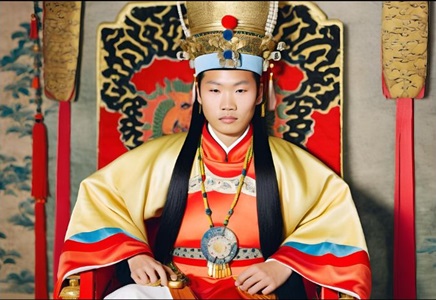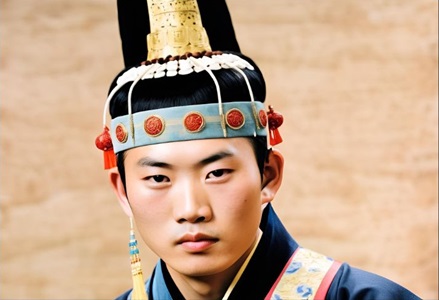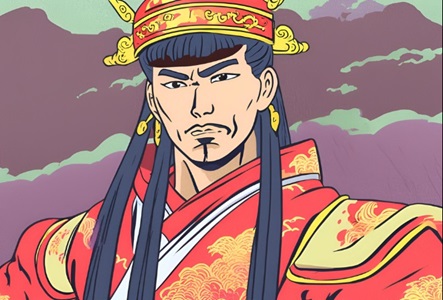Title of Biography in Chinese, Pinyin: 管叔传 (Guǎn Shū Zhuàn).
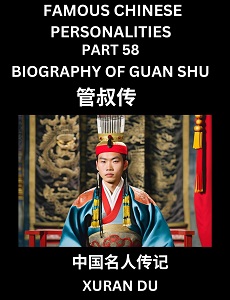
Title of Biography in English: The Biography of Guan Shu.
Check out books on my Amazon and Barnes & Noble homepages as well as the following pages to learn Biographies of famous Chinese personalities-
- Part 1 – Chinese Biography Book Series for Beginners
- Part 2 – Chinese Biography Book Series for Beginners
- Part 3 – Chinese Biography Book Series for Beginners
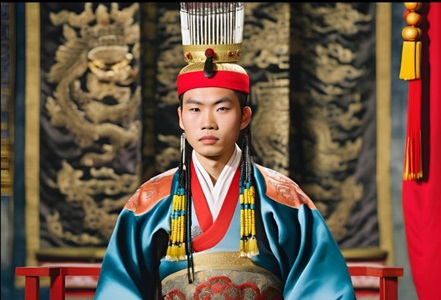
The Biography of Guan Shu in English (英文传记)

Guan Shu – The Loyal but Tragic Figure of Late Shang and Early Zhou Dynasties
Guan Shu, known by his given name Xian and belonging to the Ji clan, was the third son of King Wen of Zhou and the maternal younger brother of King Wu. He played a pivotal role in the early years of the Zhou Dynasty, following his elder brother King Wu in conquering the Shang Dynasty and establishing the Zhou. Renowned for his intelligence from a young age, Guan Shu enjoyed his father’s favor and later distinguished himself in battle.
Upon the founding of the Zhou Dynasty, Guan Shu was enfeoffed in the territory of Guan (present-day Guancheng District, Zhengzhou, Henan Province), where he established the State of Guan and became its first ruler. Diligent in governing the country, he earned the hearts of the people, fostering prosperity and harmony within his domain.
Yet, his fate took a dramatic turn with the rise of power struggles. Following King Wu’s death and the accession of the young King Cheng, who was regented by Zhou Gongdan, Guan Shu, along with Cai Shu and Huo Shu, grew discontented. Believing that Zhou Gongdan sought to usurp power, they allied with Wu Geng and the eastern barbarians to launch a rebellion known as the Rebellion of the Three Guardians. Ultimately, the rebellion was crushed by Zhou Gongdan, and Guan Shu was executed, marking the end of his state.

The life of Guan Shu stands as a testament to both glory and tragedy, becoming a case study in loyalty, power struggles, and the consequences of rash decisions. His story serves as a warning to future generations about the importance of loyalty, reason, and self-restraint in the face of power.
Learn Biography Of Guan Shu in Chinese (中文传记)

管叔,名鲜,姬姓,是周文王姬昌的第三子,周武王姬发的同母弟弟,在周朝建立初期扮演着重要角色。他自幼聪慧,深受父亲文王喜爱,后随兄长武王伐纣,为灭商建周立下赫赫战功。然而,他的命运却因一场权力斗争而急转直下,成为了历史的牺牲品。
周武王灭商后,为巩固统治,分封诸侯,管叔被封于管地(今河南省郑州市管城区),建立管国,成为管国的首位国君。他勤勉治国,深得民心,一时间管地政通人和,百业兴旺。
然而,好景不长,随着武王病逝,成王年幼即位,由周公旦辅政。这一安排引发了管叔与蔡叔、霍叔等兄弟的不满,他们认为周公旦意图篡权,遂联合武庚及东方夷族发动叛乱,史称“三监之乱”。这场叛乱最终被周公旦平定,管叔也因此被处死,其封国也随之灭亡。
管叔的一生,既有辉煌战功,又有悲惨结局,成为了后世评说忠奸、权力斗争的典型案例。他的故事警示后人,忠诚与理智的重要性,以及在权力面前应保持的清醒与克制。
Guan Shu Biography Keywords- English, Chinese & Pinyin (关键词)

- 管叔(Guǎn Shū): Guan Shu – The third son of King Wen of Zhou and brother of King Wu.
- 三监之乱(Sān Jiān Zhī Luàn): The Rebellion of the Three Guardians – A rebellion launched by Guan Shu, Cai Shu, and Huo Shu against Zhou Gongdan’s regentship during the early Zhou Dynasty.
- 勤勉治国(Qín Miǎn Zhì Guó): Diligent in Governing the Country – Describes Guan Shu’s efforts in administering his fiefdom and gaining the people’s support.
- 权力斗争(Quán Lì Dòu Zhēng): Power Struggle – Refers to the political conflicts and battles for influence and control within the royal family and nobility.
Pinyin of Guan Shu Biography (管叔传记的拼音)

Guǎn shū, míng xiān, jī xìng, shì zhōuwénwángjī chāng de dì sān zi, zhōu wǔwáng jī fā de tóng mǔ dìdì, zài zhōu cháo jiànlì chūqí bàn yǎn zhuó zhòngyào juésè. Tā zì yòu cōnghuì, shēn shòu fùqīn wén wáng xǐ’ài, hòu suí xiōngzhǎng wǔwáng fá zhòu, wèi miè shāng jiàn zhōu lì xià hèhè zhàngōng. Rán’ér, tā de mìngyùn què yīn yī chǎng quánlì dòuzhēng ér jízhuǎnzhíxià, chéngwéile lìshǐ de xīshēngpǐn.
Zhōu wǔwáng miè shāng hòu, wèi gǒnggù tǒngzhì, fēnfēng zhūhóu, guǎn shū bèi fēng yú guǎn de (jīn hénán shěng zhèngzhōu shì guǎn chéngqū), jiànlì guǎn guó, chéngwéi guǎn guó de shǒuwèi guójūn. Tā qínmiǎn zhìguó, shēn dé mínxīn, yī shíjiān guǎn dì zhèngtōngrénhé, bǎiyè xīngwàng.
Rán’ér, hǎojǐng bù cháng, suízhe wǔwáng bìngshì, chéng wáng nián yòu jíwèi, yóu zhōugōng dàn fǔ zhèng. Zhè yī ānpái yǐnfāle guǎn shū yǔ cài shū, huò shū děng xiōngdì de bùmǎn, tāmen rènwéi zhōugōng dàn yìtú cuànquán, suì liánhé wǔ gēng jí dōngfāng yí zú fādòng pànluàn, shǐ chēng “sān jiān zhī luàn”. Zhè chǎng pànluàn zuìzhōng bèi zhōugōng dàn píngdìng, guǎn shūyě yīncǐ bèi chǔsǐ, qí fēng guó yě suí zhī mièwáng.

Guǎn shū de yīshēng, jì yǒu huīhuáng zhàngōng, yòu yǒu bēicǎn jiéjú, chéngwéile hòushì píngshuō zhōng jiān, quánlì dòuzhēng de diǎnxíng ànlì. Tā de gùshì jǐngshì hòu rén, zhōngchéng yǔ lǐzhì de zhòngyào xìng, yǐjí zài quánlì miànqián yīng bǎochí de qīngxǐng yǔ kèzhì.
